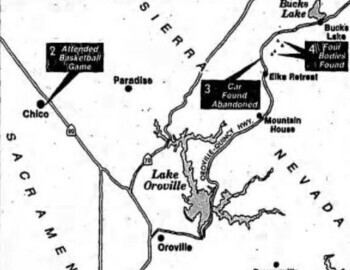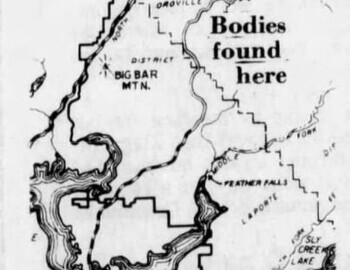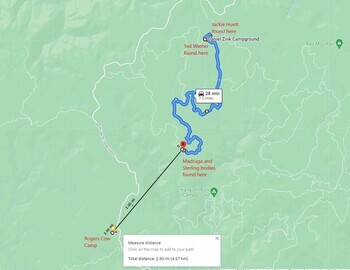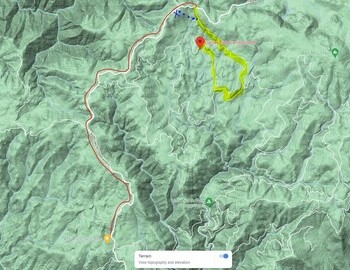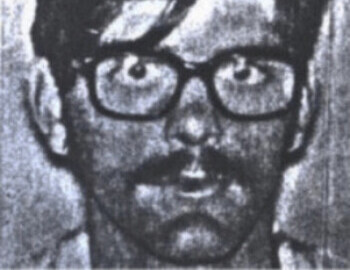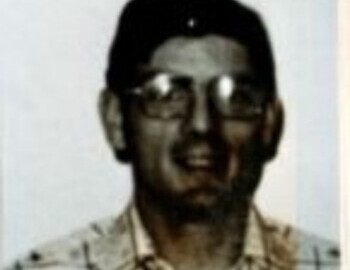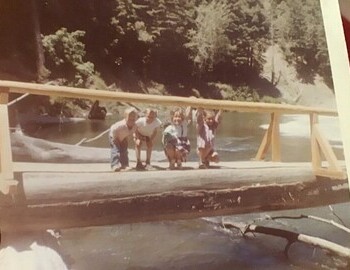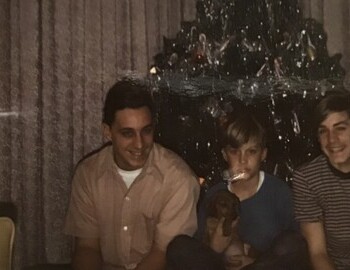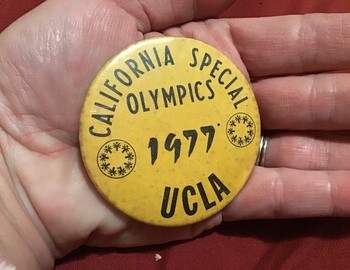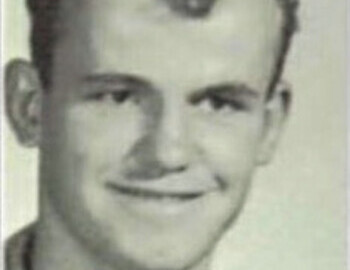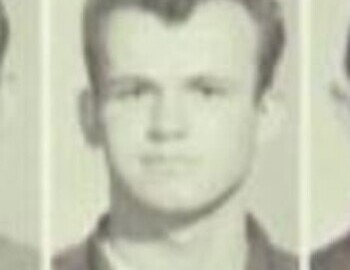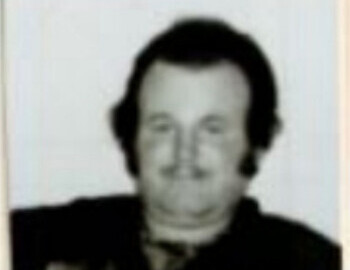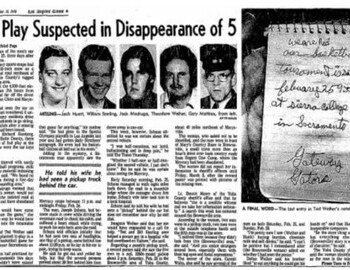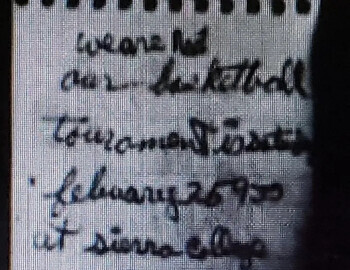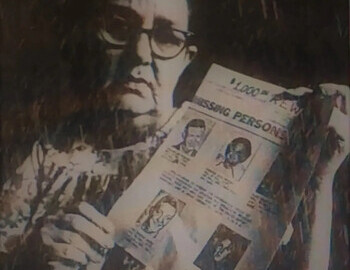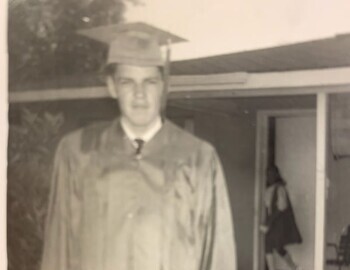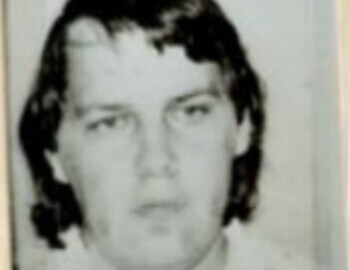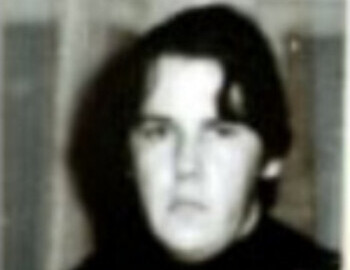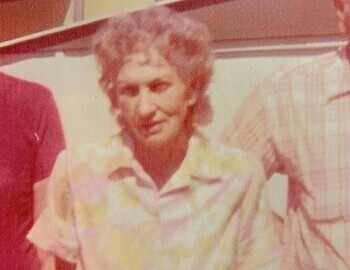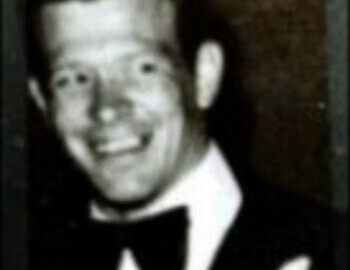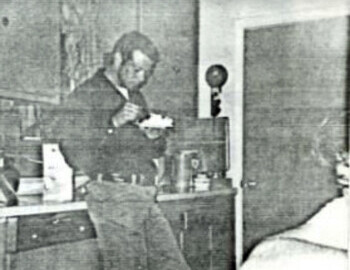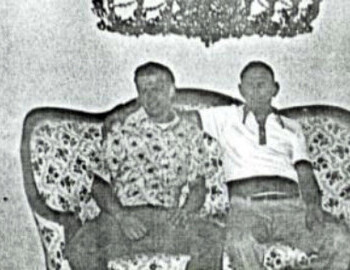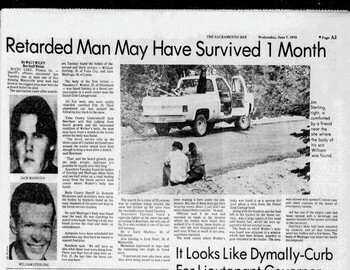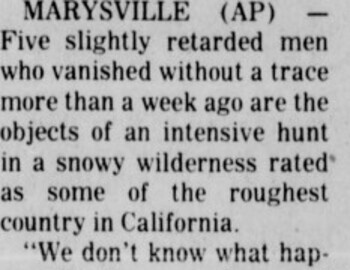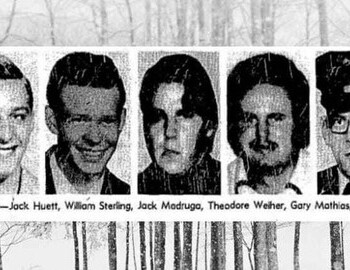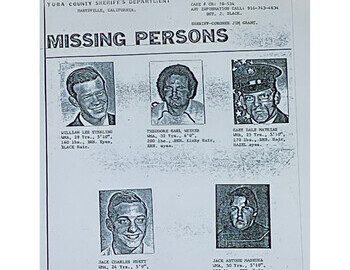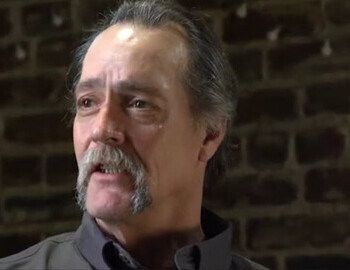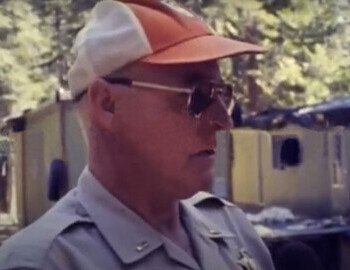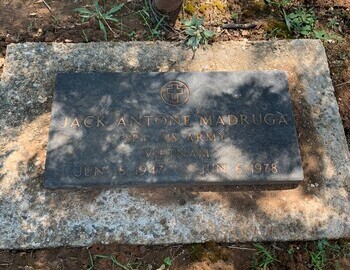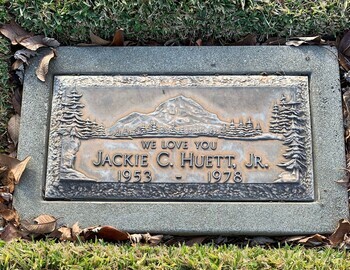
Friends With a Snowy Fate — The Case of the Yuba County Five
Are there more questions than answers in this tale of the wilderness?
Jul 13, 2021. Copyright Medium. By Rebekah Schroeder

Old footprints in the snow and a relentless wind in the air, the Plumas National Forest in Sierra Nevada, California, held bare traces of humanity across the frozen land. Most of the campers who dared navigate the terrain were experienced with the area, especially given the wintry February climate. Yet for a group of friends from Yuba City, it was a confusing final destination that left their parents perplexed and concerned following news of their disappearances.
Their names were Ted Weiher, 32, Gary Mathias, 25, Jack “Doc” Madruga, 30, William “Bill” Sterling, 29, and Jack Huett, 24, all who had developmental, cognitive, psychiatric or learning disabilities. En route from a college basketball game, the five men disappeared. They were scheduled to play the following day at the Special Olympics tournament, an event that the group — affectionately called “the boys” by their family and friends — voiced excitement over.
Till this day, many answers remain about why the group went out of their way to an unfamiliar, mountainous path rather than straight home. The case is sometimes referred to as the “American Dyatlov Pass” for its similarities of cold, unforgiving weather, multiple casualties, and genuine mystery.
On February 24, 1978, the companions decided to attend a University of California Davis match in anticipation for their own game. Leaving their homes in Marysville-Yuba-City 50 miles to the town of Chico, they were excited to see the team considered a “favorite” by the close-knitted, athletic circle. Some of them had experience working at the Gateway Project, a now-closed vocational center that helped adults with disabilities. After spectating, the team, known as the “Gateway Gators,” stopped at a convenience store right before closing time, annoying the employee who wanted to close with their 10 p.m. junk food purchase. Whoever became the winner of the upcoming game received a free week in Los Angeles, and they were looking forward to competing.
Mathias and Madruga both had their licenses, but since the car, a 1969 Mercury Montego sports coupe, belonged to the latter, it is assumed that only he drove that night. They simply had to keep along a series of roads to arrive home, but the men never made it there. A search was soon organized, because their parents insisted the quintet would never have deviated from their established plans when it was a shared aspiration among all of them to participate.
Their loved ones were fearful of their survival if stranded somewhere or met with foul play by threatening forces. Weiher had once stayed in the family home when it was burning, telling his brother to leave him alone because he needed to rest for work the next day — he was later dragged out, against his wishes. Madruga, an Army veteran, had been a truck driver during his service and was “undiagnosed,” but informally referred to as having a learning disability.
Sterling used to work at the Beale Air Force Base as a dishwasher until his mother made him quit, mainly because airmen would repeatedly get him drunk to steal his money. Religious, he spent hours reading literature to help bring Jesus to patients in mental hospitals. The youngest, Huett, could not read, write, or dial a telephone. He lived on a farm, had a beagle named “Beau,” and was best friends with Weiher.
Mathias was the only person to deviate from the group in this regard, as he had paranoid schizophrenia, not the same conditions as his friends. In his own Army term five years prior, stationed in Germany, the symptoms earned him a medical discharge.
When he wouldn’t take his medication and lapse into psychosis, he “went haywire,” according to his stepfather. Nonetheless, Mathias began working for his stepfather’s gardening business and took his medication so faithfully that he was billed as a “success case” who had not relapsed in some time. Severe snowstorms rolled in during the search, further compromising the investigation.
Then, a forest ranger found Madruga’s car far away from the location everyone believed them to be nearby, and the vehicle was in working order with gas in the tank. About 70 miles from their original route and at 4,500 ft elevation, they might have become temporarily stuck, but the five of them could have easily pushed it from its position back onto the road. While traces of their last sighting such as candy wrappers were left behind, in light clothing unsuited for the climate, the men seemed to have fled the warmth of the car for an unknown reason.
- 2 -
Melba Madruga, Jack’s mother, insisted that her son would not have voluntarily abandoned the car or taken the uphill drive during the night. Theories emerged of where they could have ended up. Mathias knew friends in nearby Forbestown, so authorities believed he may have encouraged his friends to travel there during the journey, but they had not seen him for a year before the drive. On June 4, Weiher’s body was found first by visitors to a Forest Service trailer about 19 miles from the car.
His feet were frozen solid and gangrenous, with eight sheets pulled up to his chin. Reports disclosed that Weiher died either from pulmonary edema or lung failure caused by exposure and starvation. Strangely, the trailer was broken in through the window with enough food to keep five adult men alive for a year, as well as matches, extra clothing, blankets, and a propane tank. Three cases of C-rations had been completely consumed, each with 12 individual meals. Mathias and Madruga would have been experienced with using an Army P-38 can opener to get into the necessary sustenance, leading one Butte County lieutenant to surmise that Weiher, Huett and Mathias went onto camp in the trailer together following the other two’s deaths.
From the growth of his beard, a Plumas County pathologist determined Weiher lived anywhere between eight and 13 weeks after the disappearance, but The Sacramento Bee gave a closer timeline of more like 4 to 6 weeks. This could indicate that if an earlier search found the trailer, he very likely could have been alive. Yet, there is little information about whether Weiher was actually freshly shaven at the time, and if that could have impacted the results.
The 5’11” and formerly 200-pound man had lost about 80 to 100 pounds in total.
Partial remains of the others were discovered with the exception of Mathias, whose body has never been found. Sterling and Madruga’s bodies were about 35 miles on the way to the trailer. Closer to his friend, Huett was discovered under a bush by the Daniel Zink campground. According to different sources, Jack Huett’s father or brother-in-law apparently found the body.
“I knew when they found Ted, Jackie would be nearby,” said Sara Huett, Jack’s mother, to The Sacramento Bee in 1978.
The men had all died from a combination of exposure and hypothermia, their bodies significantly mauled by animals in the time it took the snow to melt.
Following the discovery of the four men, witnesses began coming forward with claims of sightings. Joseph Schons, sometimes referred to as Joseph Shones, 55, stated that he came up that night to check his cabin for an upcoming trip with family. Between 11 p.m. and midnight, his car became stuck in snow and he suffered a heart attack while trying to push it back onto the road. While resting in his car, he said he saw headlights and what appeared to be a woman with a baby in the vehicle. He yelled for help, but the car drove away and turned the lights off, perhaps scared. However, Schons himself doubted his initial account of everything, and the story changed several times. (Source: Catalin Manea / Pexels)
Police thought his claims were believable, yet it is generally thought that the boys would have responded to help. Imogene Weiher stated that her son and Sterling once helped a person get to a hospital who had overdosed on Valium. If they thought their car was stuck and that they could not find the way home, why would the five of them run from potential assistance?
Afraid, the quintet might have not been thinking rationally, but their route indicated a skillful handling of the tough roads from experience, which none of them possessed. It is unknown why they went in the direction of the mountain rather than straight home.
Sterling and Weiher allegedly “abhorred cold weather and the outdoors,” while several of the men were afraid of the dark. Once, on a fishing trip at a cabin, Sterling attended and did not have fun. Every time the family went afterwards, he stayed home, showing his disinterest.
Those kinds of mysteries still pervade the Yuba County Five case, as the men were known to follow patterns rather than deviate from them so drastically and right before a life-changing opportunity.
The families of the boys ultimately believed that they were forced or frightened into the wilderness. One of the men’s cousins, Ron Harmon, said that they were able to handle themselves normally, but their behavior tended to deteriorate under stress. Other thinking ventured into darker territory, particularly relating to Mathias’ criminal history. A more recent Sacramento Bee article claimed to uncover details that following a “bad hallucinogenic trip,” as described by Mathias’ parents, he was in repeated conflicts with the law.
Written in 2019, the piece brought to light that Mathias had a record, and new information, eyewitness accounts, as well as new access to police files pointed the finger at him for endangering the group. The Sacramento Bee stated that initially, Mathias punched a police sergeant in the face and subsequently groped his cousin’s wife, 17, while she rested in another room. The events are contested by local papers such as The Marysville Appeal Democrat, who originally covered the charges at the time of his arrest and stated that Mathias was in jail because of the fondling incident rather than in the opposite order.
He plead guilty, dropping the battery of a peace officer and charge of assault with intent to rape as a result of a deal. Many of the other assertions are only loosely backed up by circumstantial evidence. (Source: Missing Veterans)
If Mathias did intend to cause harm, why would they all have died from the elements, not brute force? While he could have led them astray as his medication supply dwindled, the withdrawal causing his schizophrenia to reappear full-force, there are simply not enough clues to definitively incriminate Mathias for what happened to the rest of the men.
The Yuba County Five are remembered for the way they fostered a close friendship. Even at the end, shivering from cold and starving, the men left behind clues that their bonds held together in the dark mountains. Whether it was someone covering Weiher’s body or Sterling and Madruga spending their last moments with each other, as death approached, they persevered.
What was supposed to be a night of harmless fun instead led to icy graves. One day, the truth might melt from the ground, potentially revealing why they did what they did.
Yuba Podcats
"This case is bizarre as hell."
— Jack Beecham, Yuba County Undersheriff (1977-1979)
On February 24, 1978, five men from the Yuba County, California-area vanished in the wilderness of Northern California. They had set out on what should’ve been a quick road trip to watch their favorite basketball team in a neighboring town. But all five friends wound up missing or dead.
The finer points of this story are more complicated, though. Three of the men - Ted Weiher, Jackie Huett, and Bill Sterling—would likely fall on the autism spectrum today. One of the men - Gary Mathias - was a person living with schizophrenia. And the last man - Jack Madruga, the person driving - was never diagnosed at all.
Days after their disappearance, Madruga’s 1969 Mercury Montego was discovered abandoned 60 miles east of Chico, on an isolated, snow-packed mountain road deep in the Plumas National Forest.
Months later, a group of motorcyclists happened upon the emaciated, decomposing body of Ted Weiher, tucked neatly under eight sheets, inside an empty off-season forestry trailer 12 miles north of where the car was deserted. Based on beard growth, experts estimated Weiher had survived at least two months.
In the days following, searchers found the skeletal remains of Sterling, Madruga, and Huett nearby. None of the men, officials claimed, died of foul play. The body of Gary Mathias has never been recovered.
Timeline of events
| 05-26-1946 | Theodore Earl Weiher born |
| 06-18-1947 | Jack Antone "Doc" Madruga born |
| 04-05-1949 | William Lee Sterling born |
| 10-15-1952 | Gary Dale Mathias born |
| 03-29-1953 | Jackie Charles Huett Jr. born |
| Mid-1970s | Ted Weiher, Jackie Huett, Bill Sterling, and Jack Madruga began working at Gateway Projects. |
| 1977 | Gary Mathias began playing on the Gateway Gators with Weiher, Huett, Madruga, and Sterling. |
| 02-23-1978 | A forest service snow cat ran up the road to the trailer, leaving a packed path in the snow that the men might have followed. |
| 02-24-1978 | 6 PM Joseph Schons’ VW Beetle bottomed out at the snowline on a recreational road near Rogers Cow Camp and he suffered a heart attack trying to push it free. |
| 6:30 PM The men departed for the basketball game at Chico State University. | |
| 10 PM The men drove to Behr’s Market, three blocks away from the Stadium, bought snacks for the drive home, and then left the store. | |
| 12 AM Schons claimed he saw a car matching the Mercury Montego on the road near Rogers Cow Camp. | |
| 02-25-1978 | 8 AM Melba Madruga reports her son as missing to the Yuba County Sheriff’s Department but is told to wait 24 hours and call back. |
| 8 PM Melba Madruga filed an official missing persons report. The search began between Marysville and Chico. | |
| 02-28-1978 | A forest service ranger discovered the abandoned Mercury Montego on a recreational road near Rogers Cow Camp. The search for the men shifted to the Plumas National Forest. |
| 03-30-1978 | Official search efforts were called off until new leads developed. |
| 06-04-1978 | Sixteen-year-old Roger Koch discovered the badly decomposed body of Ted Weiher, tucked neatly beneath eight sheets, in a forestry trailer near the Daniel Zink Campground. |
| 06-05-1978 | Yuba County officially identified Ted Weiher as the man whose body was found in the forestry trailer. There were no signs of foul play. Officials note that Weiher’s shoes were missing, but Mathias’ were left behind, which led investigators to believe the two men were at the trailer together. |
| 06-06-1978 | The remains of Jack Madruga and Bill Sterling were found on opposite sides of a canyon road roughly three miles north, as the crow flies, from the abandoned Montego and seven south of the service trailer. |
| 06-07-1978 | Jackie Huett’s body is discovered by his father, Jack Huett Sr., less than a mile away from the trailer. The search for Gary continued. |
| 06-09-1978 | Two Forest Service workers claimed they told Butte County about the trailers at the Daniel Zink Campground. |
| 06-20-1978 | Plumas, Yuba, and Butte Counties called off their search for Gary Mathias. |
Maps and photos

